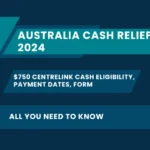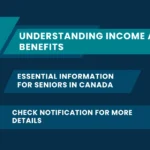The GST/HST credit in Canada is returning with updated dates for 2024. This program is designed to assist low- and middle-income Canadians in alleviating the burden of sales tax. If you reside in Canada and are looking to benefit from the GST/HST credit, there’s great news for you!
The upcoming payment dates for the GST credit in 2024 have been announced. This financial support program is tailored specifically for individuals in lower and middle-income brackets to help lessen the impact of sales tax. Let’s explore when you can expect to receive this assistance and how to take advantage of the Canada GST/HST credit, along with comprehensive information on HST Netfile, rebates, and tax credits.
Canada’s GST (Goods and Services Tax) and HST (Harmonized Sales Tax) credits serve not only as a source of financial relief but also as a means to help you manage tax expenses throughout the year! For those with low or middle incomes, these credits provide crucial support, making essential purchases more manageable. So, let’s find out when you can access these funds and how to incorporate this program into your financial planning.
Announcement of Canada GST/HST Credit Payment Dates
The Canada GST/HST credit is credited to your account four times a year, specifically on the fifth day of January, April, July, and October. These consistent payment dates are a key part of your annual financial planning. The payment dates for 2024 are as follows:
| 5 January 2024 | 5 April 2024 |
| 5 July 2024 | 4 October 2024 |
The Canada GST/HST credit payments are determined by the income details reported on your tax return from the previous year. If you don’t update your tax information, the amount of relief you receive may be inaccurate. Therefore, keeping your financial details current is crucial for effective budgeting.
Keep in mind that your financial support relies on the information you submit. Failing to update your details on time could quickly jeopardize your eligibility for relief!
What is the GST/HST Credit and Why is it Important?
The GST/HST credit is a tax-free payment issued quarterly to help offset the sales tax burden you incur throughout the year. This credit is specifically designed for low- to moderate-income individuals and families. It plays a significant role in managing your budget by making essential expenses—like food, utilities, and clothing—more affordable, ensuring that the added cost of sales tax doesn’t become a financial strain.
GST/HST Credit Amount: What Relief Can You Expect in 2024?
The amount you can receive from the GST/HST credit varies based on your household’s adjusted net income and the number of children under the age of 19. For 2024, eligible recipients may receive the following amounts:
- Single individuals: Up to $519 per year
- Couples (married or common-law): Up to $680 per year
- For each child under 19: $179 per year
For families, the total GST/HST credit is the combined amount for the couple and the credit for each child. For instance, a married couple with one child could receive a total of up to $821 in GST credits annually. Therefore, it is essential to maintain accurate and up-to-date tax information to ensure you receive the maximum credit based on your financial circumstances and family composition.
How to Apply for the Canada GST/HST Credit in 2024
The good news is that you don’t need to submit a separate application for the GST/HST credit. By simply filing your income tax return, you will automatically be considered for the program, as long as you meet the eligibility criteria. It’s important to file your taxes every year, even if you have no income, to ensure you remain eligible for the Canada GST/HST credit.
If you are a new resident of Canada, you will need to complete Form RC151 (GST/HST Credit Application) and send it to the Canada Revenue Agency (CRA). This form is available on the CRA website and enables new Canadians to access these essential financial benefits promptly.
Netfile Deadlines and Filing Requirements
Managing GST/HST payments is also crucial for businesses. Companies must remit the GST/HST collected from customers to the CRA. Payment schedules for the Canada GST/HST credit vary based on your filing frequency—monthly, quarterly, or annually:
- Monthly filers: Payments are due by the last day of the month following the reporting period.
- Quarterly filers: Payments must be made by the last day of the month after the quarter ends.
- Annual filers: Returns and payments are due by April 30 of the following year.
Utilizing Netfile, an online system provided by the CRA, is the most efficient way to ensure timely filing and payment of GST/HST returns. Failing to meet these deadlines could result in penalties and interest charges.
Tips for Managing GST/HST Credits and Payments
- File Annual Income Tax Returns: Ensure you file your tax returns on time each year to qualify for the GST/HST credit.
- Complete Form RC151 for New Residents: If you are new to Canada, make sure to fill out Form RC151 and submit it to the CRA to access the credit.
- Keep Tax Information Current: Regularly update your tax details to receive the correct amount of credit.
- Utilize Netfile: Take advantage of the CRA’s online system for efficient filing of GST/HST returns and payments.
- Adhere to Deadlines: Be mindful of monthly, quarterly, or annual payment deadlines to avoid penalties and interest charges.
Fact Check
Rumors about specific government payments often stem from misunderstandings of existing benefits or exaggerated claims circulating online. It’s crucial to rely on official sources for accurate information.
As of 2024, there has been no federal announcement regarding deposit payments. Most payments for government programs will depend on individual circumstances, such as income, work history, and eligibility criteria. To protect yourself from misinformation, always verify claims through official government websites or consult a financial advisor.




